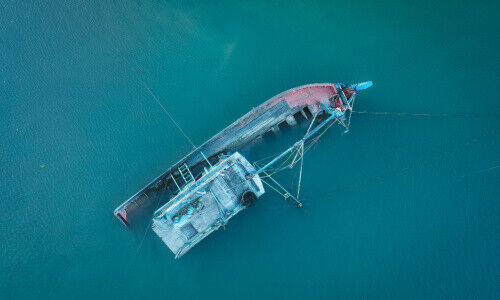The Upside Down Restaurant that Didn't Sink
A new twist in the sunken seafood restaurant saga encapsulates the double speak that is becoming increasingly prevalent in Hong Kong.
So now it didn't sink. It just capsized. At least that is what a spokesperson discussing what happened to Hong Kong's Jumbo floating restaurant told the «South China Morning Post» (paywall), an English language daily, on Friday.
If possible, and this pun is fully intended, let the information from that link fully seep in. Even though capsizing is generally a good and reasonable prelude to a full and complete demise of a typical ocean-going vessel, the spokesperson was not in a position to divine whether the capsized restaurant still floating peacefully in the middle of the high seas off Vietnam and Hainan was above or below water, like some antiquated underwater attraction.
This is all somewhat comprehensible. The company owning the restaurant probably didn't notify local marine authorities of the incident within 24 hours of it happening. Now they are backpedaling furiously in order not to be put in the uncomfortable position of having breached regulations, which is likely to bring untold bureaucratic pain, costs, and the filling out of monotonous forms no one gets right on the first attempt.
Other Incidents of Double Speak
Another English newspaper, the Standard, claims it is still floating, tugboat at its side, in the waters off the Paracel Islands. If that is the case, someone might want to tell to the spokesperson who discussed the situation with the SCMP. If it happens to be the same person, something quite strange would seemingly be afoot here.
But there is a larger point, and one that is likely increasingly worrying the remaining expatriates in Hong Kong, particularly those with children. There have been similar incidents of double-speak here recently related to whether the city was a British colony or an occupied territory in a planned history textbook for students.
Although most western media appeared to report it relatively accurately, as the BBC did, local legislators were far too thin-skinned in their response. Does it matter all that much if it was a colony or an occupied territory? Whatever the case, it would be hard to completely eviscerate British history and influence given the preponderance of street signs with names like «Connaught», «Arbuthnot» and «Wyndham». Not to mention the fact there are two major British banks of some repute right in the middle of town, and a Cenotaph.
Future International Curriculum
But the discussion probably only served to heighten the discomfort parents are likely having due to the uneasy relationship between international schools and the national security law. As it is currently understood, they don't have to deliver a specific curriculum on it but they have to help students «acquire a correct and objective understanding» of the concept.
Many highly mobile, qualified teachers at the international schools have been expressing a strong inclination to leave and almost all, when asked, have been ignoring internal messages asking them to attend sessions to discuss it. But although that is the current state of affairs now, no one knows what the situation will be like in five years. And it begets the question as to whether any parent ever wants their child to be exposed to any of this.





















